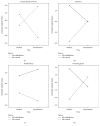Efficacy of a Computer-Assisted Cognitive Rehabilitation Intervention in Relapsing-Remitting Multiple Sclerosis Patients: A Multicenter Randomized Controlled Trial
- PMID: 29463950
- PMCID: PMC5804109
- DOI: 10.1155/2017/5919841
Efficacy of a Computer-Assisted Cognitive Rehabilitation Intervention in Relapsing-Remitting Multiple Sclerosis Patients: A Multicenter Randomized Controlled Trial
Abstract
Cognitive impairment is frequently encountered in multiple sclerosis (MS) affecting between 40-65% of individuals, irrespective of disease duration and severity of physical disability. In the present multicenter randomized controlled trial, fifty-eight clinically stable RRMS patients with mild to moderate cognitive impairment and relatively low disability status were randomized to receive either computer-assisted (RehaCom) functional cognitive training with an emphasis on episodic memory, information processing speed/attention, and executive functions for 10 weeks (IG; n = 32) or standard clinical care (CG; n = 26). Outcome measures included a flexible comprehensive neuropsychological battery of tests sensitive to MS patient deficits and feedback regarding personal benefit gained from the intervention on four verbal questions. Only the IG group showed significant improvements in verbal and visuospatial episodic memory, processing speed/attention, and executive functioning from pre - to postassessment. Moreover, the improvement obtained on attention was retained over 6 months providing evidence on the long-term benefits of this intervention. Group by time interactions revealed significant improvements in composite cognitive domain scores in the IG relative to the demographically and clinically matched CG for verbal episodic memory, processing speed, verbal fluency, and attention. Treated patients rated the intervention positively and were more confident about their cognitive abilities following treatment.
Figures









References
-
- Papathanasiou A., Messinis L., Zampakis P., et al. Thalamic atrophy predicts cognitive impairment in relapsing remitting multiple sclerosis. Effect on instrumental activities of daily living and employment status. Journal of the Neurological Sciences. 2015;358(1-2):236–242. doi: 10.1016/j.jns.2015.09.001. - DOI - PubMed
Publication types
MeSH terms
LinkOut - more resources
Full Text Sources
Other Literature Sources
Medical

